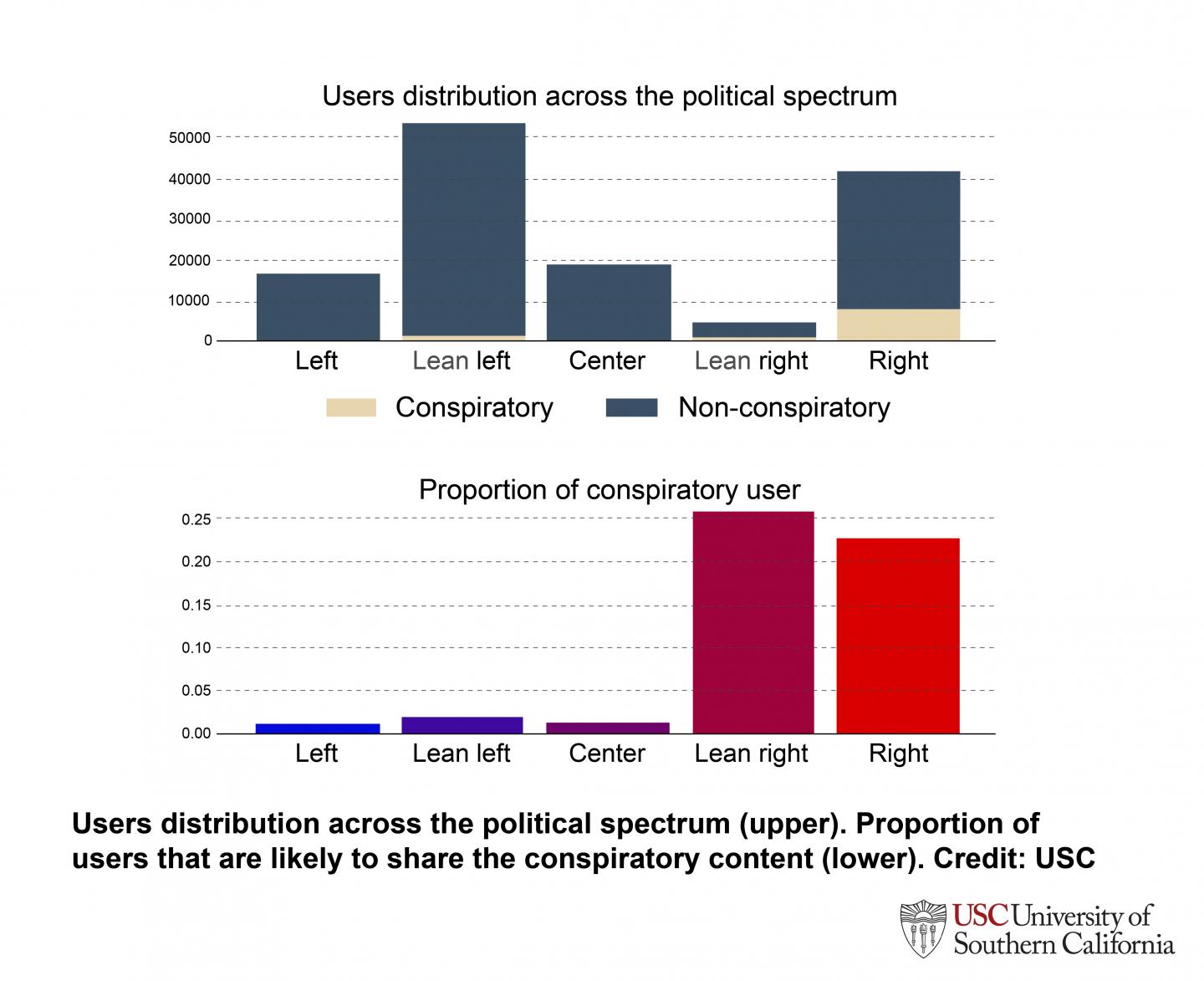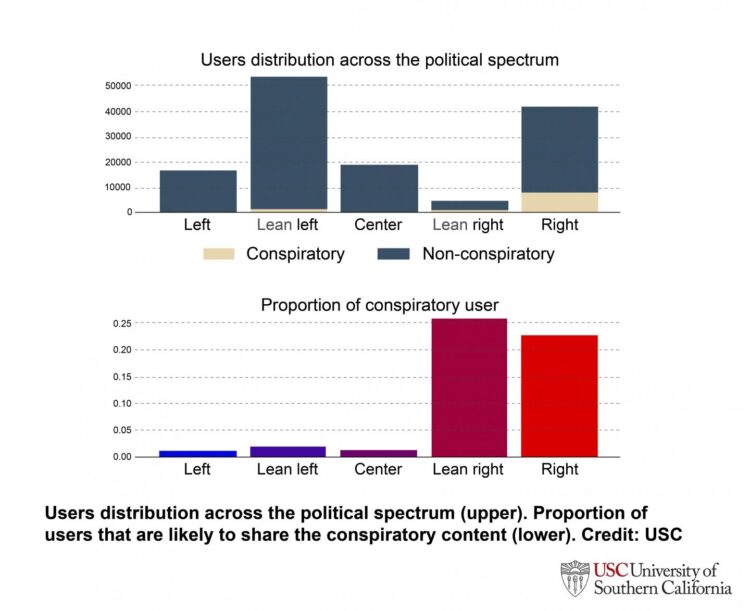The partisan divide — among the bots

Credit: USC Institute for Information Sciences
Bots and conspiracy theorists have infested the Twitter chatter around the upcoming U.S. presidential election, USC researchers have found.
Looking at more than 240 million election-related tweets, the study found that thousands of automated accounts, known as bots, had posted tweets about President Donald Trump, his Democratic opponent former Vice President Joe Biden and both their campaigns.
Most of these bots were promoting right-leaning political conspiracies like QAnon. Even though the bots are believed to have been responsible for a few million of the tweets, they likely reached hundreds of thousands of Twitter users.
The USC study was published Wednesday by the journal First Monday, just days before the Nov. 3 election. The research focused on election-related tweets from June 20, 2020, to Sept. 9, 2020, and other data from Twitter during that period. The USC researchers wrote that their analysis was an attempt to chart the landscape of social media manipulation in the 2020 election.
“I think the most important finding here is that bots exacerbate the consumption of content within the same political chamber, so it increases the effect of echo chambers or the salience of those tweets,” said the study’s lead author Emilio Ferrara, associate professor of computer science at the USC Viterbi School of Engineering and associate professor of communication at the USC Annenberg School for Communication and Journalism. He also is a research team leader at the USC Information Sciences Institute.
Bots almost exclusively retweeted original posts by Twitter users who are human, the scientists noted. In turn, many humans retweeted the bots’ messages that aligned with their political leanings, which then led to additional retweets and replies.
The bots were identified by Botometer, a machine learning-based tool developed by USC and University of Indiana scientists to identify likely bots based on their tweeting behavior and several other characteristics.
Election 2020: A significant partisan divide on Twitter
Throughout their analysis, the research team identified significant differences between bots and humans and the type of election content they tweet and retweet on the social media platform.
In addition to studying the bots, the researchers examined the political leanings of real human users and common hashtags in those 240 million tweets, as well as any tweets containing stories or other content from partisan media and traditional news outlets.
Highlights of the study included:
- Right-leaning accounts significantly outnumbered their left-leaning counterparts by 4-to-1 among bots and by 2-to-1 among humans.
- Users that shared or retweeted news from right-leaning media platforms were almost 12 times more likely to share conspiracy narratives than users that shared or retweeted content from left-leaning media (25% vs. 2%).
- The conspiracy theories that the researchers traced in tweets included the far-right conspiracy QAnon, as well as conspiracies such as “pizzagate,” a debunked claim linking Democratic Party officials and U.S. restaurants with child sex trafficking. They also studied which users were likely to share politically biased COVID-19 conspiracy narratives about the origins of the coronavirus or unsupported claims about treatments for the disease.
- About 13% of all users sharing conspiracy narratives were suspected bots. The proportion of users tweeting about QAnon were most concentrated in certain states: Alaska, Idaho, Kentucky, Mississippi, Montana and Oklahoma.
- Just 4% of the bots shared news from left-leaning and centrist media outlets, including The Washington Post, The New York Times, Los Angeles Times, ABC News, BBC, CNN and others.
- About 20% of users that shared content from right-leaning media (e.g. Breitbart, OANN and Infowars) were likely bots.
Foreign interference continues to threaten election integrity
Ferrara led a study in 2016 just before President Trump was elected that revealed the prevalence of what turned out to be foreign-operated bots, mostly Russian, on Twitter seeking to distort the election chatter. Ongoing U.S. investigations since have shown a consistent pattern of election cybersecurity threats from Russia, China and most recently Iran.
The latest study noted some foreign countries engaging in manipulation that previously were not.
After analyzing Twitter’s data on recently banned users, the researchers noted that Ghana and Nigeria had launched information campaigns to target left-leaning users about the Black Lives Matter movement. Saudi Arabia and Turkey also had high engagement with right-leaning users; Russia and China mostly targeted left-leaning fringe groups and conservative groups.
“In short, the state of social media manipulation during the 2020 election is no better than it was in 2016. We are very concerned by the proliferation of bots used to spread political conspiracies and the widespread appeal that those conspiracy narratives seem to have on the platform,” Ferrara said. “The combination of automated disinformation and distortion on social media continue to threaten the integrity of U.S. elections.”
###
Other study authors were doctoral students Herbert Chang at USC Annenberg and Emily Chen at USC Viterbi, as well as postdoctoral fellow Goran Muric and master’s student Jaimin Patel, both with the USC Information Sciences Institute.
The work was not supported by any funding agency, private organization, or political party.
Media Contact
Emily F Gersema
[email protected]
Original Source
https:/





